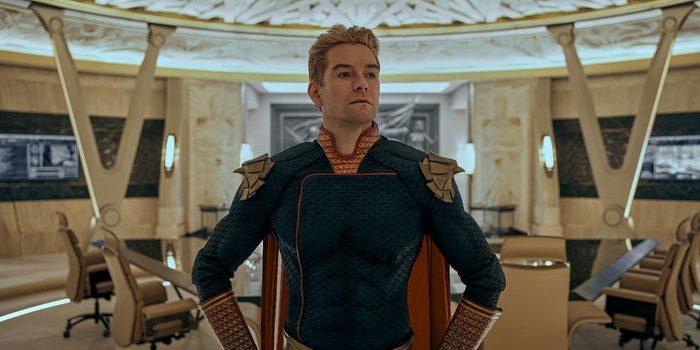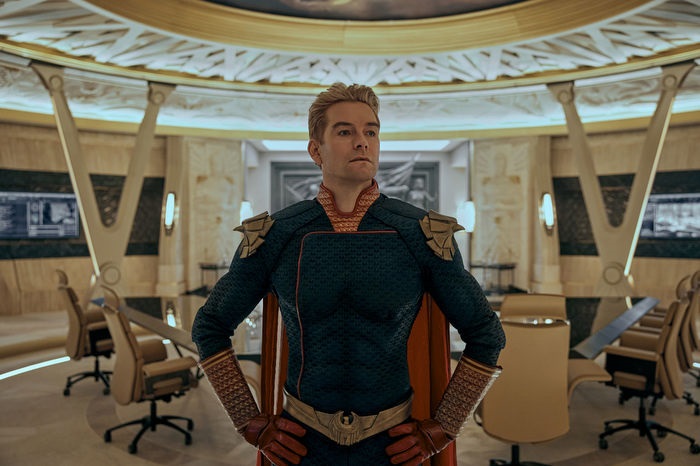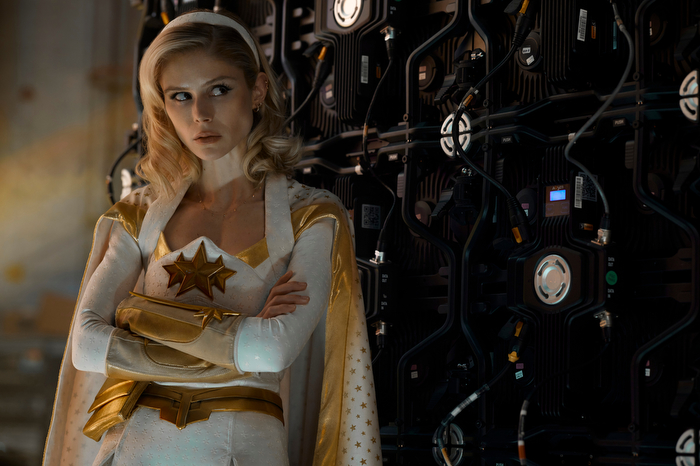The Prime Video smash hit, The Boys is back for a raucous season 3. The Movie Mensch was invited to participate in a roundtable with just a few other journalists chatting with two of the show’s headliners, Erin Moriarty, who portrays the unshakable Starlight, and Antony Starr, who in many ways portrays the show’s most important—or at least most vital to the plot—character, Homelander.
Both characters provide priceless challenges for their acting toolbox with every passing episode. These two characters, in particular, we were thrilled to see paired for this interview. Yes, there is a narrative reason for the pairing that plays into a major season 3 story thread. It is also quite apt due to the fact that these two actors are tasked with the greatest change, from what the audience expected of them during that pilot episode, and then what they received by those first closing credits—to what they are doing and focusing on throughout season 3.
Moriarty and Starr dish on their characters’ collective inner struggles, which are vastly different, as well as the benefits of looking nothing like your character (Starr) thanks to hair dye and makeup. I also ask the duo, since they do spend a lot of time together during this third season, what they enjoy most about working with the other. Their answers will surprise.
Q: First question for you, Erin. At the end of The Boys season two, we see that Starlight has rejoined The Seven. This season, we’re going to see her battle with this internal struggle of whether or not she can do the best within the organization or from outside of it. As an actress, how did you create the space for yourself to dive into that dilemma?
Erin Moriarty: I think firstly, the benefit of working in television, which is one of my favorite parts, is that when you spend two seasons in the shoes of a character, they almost become second nature to you. You’ve lived the experiences that have brought you up to the point of season three. So that automatically helps me tap into it. And then I think… sorry, there’s a little bit of sound outside that I’m getting distracted by. I think that, primarily, living her experiences that happened during season 1 and 2 helps me prepare. Then in addition to that, really getting to the point where I felt like her evolution and her decisions has been contemplated for the past two seasons. At the same time that she gains clarity, I, Erin, agree and gained that clarity that leads to the decision she makes towards the end of the season about whether she’s going to be involved in the organization or not.
Q: As the show has steadily gained fans over the years, especially since the pandemic and the popularity of the program has soared, does either of you been “noticed” more when out in public?
Erin Moriarty: I have. You less.
Antony Starr: I don’t get that because I don’t look anything like the character.
Erin Moriarty: Yeah. He benefits from the hair dye. But I will, occasionally. I’ve had a Starbucks cup written out as Starlight before without me telling them… and it’s sweet. It’s really nice. It’s like a nice little nod.
Q: Erin, when we first got to know you at Comic-Con 2019, at one of the press conferences you told us that you were relieved that Starlight wasn’t the stereotypical blonde character and that you were glad her character was so well crafted. Looking back from then to now, what are the things you really value about Starlight and Annie and her character in her journey?
Erin Moriarty: Really what I most value about her is that we’ve seen typically the ingenue, the naive ingenue. Or, which the latter I love, the kind of kick-ass female lead that’s a superhero. But I think what I like about Starlight is that she’s both vulnerable and strong and that neither of those traits negates the other. You can be simultaneously vulnerable and badass. In fact, embracing that just makes you stronger. So, I think creating a character that doesn’t fit in any pigeonhole and having her be empathetic and emotionally intelligent whilst also being literally and figuratively strong and resilient. I like that kind of paradoxical combination of traits that she exemplifies. It makes her different and nuanced.
Q: What is the best part of playing Homelander?
Antony Starr: The best thing? Well, in a sea of good things, the best thing used to be that I don’t have to do fight sequences, but that changed this season because my body’s getting old and falling apart and I don’t do well with them. But now, it’s a great character to play, and Jensen and Karl and I have a good three-way superhero combat scene in episode six. It’s a lot of fun and…
Erin Moriarty: And a naked Jack (Quaid)?
Antony Starr: There’s that, but that might be more about you than me. Just saying. There’s so much good in the, well, there’s not good in the character, but there’s so many enjoyable parts of playing the character. I don’t know how I’d pick. But I also really enjoy getting to find the little bits of light within the darkness. We managed to achieve that, particularly in season three.
Q: Yes. Hello to you. Congratulations on another great season. My gosh, this show just blows me away.
Erin Moriarty: Thank you.
Q: Your two characters since the beginning have been, I’d say a little testy in terms of a description of their relationship. But that doesn’t come really easy. What is your biggest takeaway from working so much with the other?
Antony Starr: Do you know what? As the show’s gone on across the board, I mean, it’s a great cast and just typical actor spiel. But in this case, it’s actually true. We actually have a really great cast. And as we’ve got to know each other and our friendships outside of work have developed, that can only lend itself to what’s going on. There’s just an understanding and an ease with each other, and a shorthand about creative and collaborative discussions. It just makes everything flow better. And as Erin said a bunch of times, everyone turns up really well prepared. And especially I know you really do. I sure as hell do as well. But everyone does, but I know in our scenes specifically, it just makes the whole process just very fluid.
Erin Moriarty: I feel like I’ve learned from you because-
Antony Starr: Probably.
Erin Moriarty: No.
Antony Starr: Probably.
Erin Moriarty: I’m going to feed his already…
Antony Starr: Please, please feed my ego.
Erin Moriarty: [laughs] ever-growing ego. But no, I have. I’ve learned from you. I’ll tell you why. This is my favorite part about working with Ant. There’s a presence there. There’s a constant, and it’s not excessive, but self-analysis. There’s a mindfulness and a thoughtfulness. When we do the scene and then we cut, you think about it. Then you come back, and you alter it a little bit. I can get locked in my patterns. That’s one of my problems. That’s one of the things that I constantly work on. Antony will alter and change until he finds it. But you’re really present and you’re really thoughtful. You’ll make little different choices in each take. That then causes a different reaction in me, and it allows me to stay more present. I’ve taken that to even other jobs. I don’t know, there’s a presence there and a thoughtfulness that I think is really cool that I enjoy when working with Ant a lot. That’s very specific to him.
Antony Starr: It’s called neurosis.





